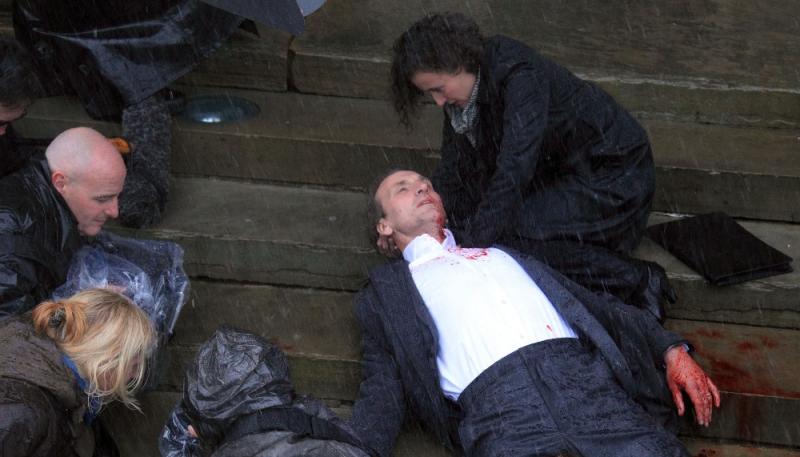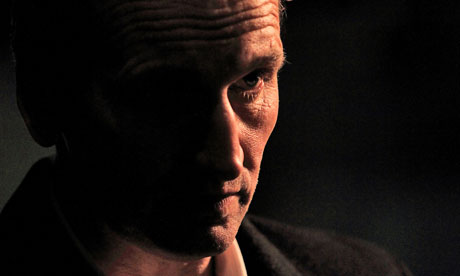I must have been nine years old when I first became conscious of my own reflection, before I took even a vague interest in chucking on anything that wasn’t Power Ranger- (or, (on a particularly daring day, Pokemon-) inspired. I can be so express with the age because, coincidentally, my elder brother developed appearance-awareness at the same time. It was as if we were jockeying for position in the pre-teen Cooney style-stakes, vying to look the most like a hapless boy-band wannabe and sizing up one another’s wardrobes at the breakfast table like a pair of snooty playground mums. On a Sunday evening that we had obviously put our fashion face-offs aside, we agreed to take a few snips of each other’s hair; David Beckham’s bouncy middle parting was, I can remember, the envy of every remotely style-savvy boy in school and the long fringes my mum had lumbered us with seemed to plead for rapid change. Oliver was, as the cherished firstborn, comparatively conservative in what did with mine. I had a few ugly hacks out the front but it looked pretty swanky compared to what he wound up with. Nine was also the age I learnt of my own extreme heavy-handedness. Rather than a middle parting, I carved a lopsided semi-circle from his fringe and obliterated any hair around his ears for good measure; the breakfast-table style stakes were mine for months on end. After a night’s dressing down from mum, and hours of being told what prized berks we looked like, I dreaded walking through the school gates the next day; I recalled the reaction that met Lucy Johnson’s holiday cornrows fiasco and shuddered. The only thing that got me into the playground that Monday morning was knowing Oliver looked a dam site worse than I did, that my barnet would pail into significance when set alongside the sorry mess I’d left atop his head.
So I guess it really is all relative. As Aesop said, “There is always someone worse off than yourself”, and its a heartening thing to bear in mind. When I caught up with the premiere episode from the Beeb’s three part drama “Blackout”, which concluded this Monday, this comparable optimism hit especially hard. Despite an ailing student bank balance, a summer that tempts me to renounce my UK residency and Amanda Holden being on telly every night this week (thanks a bunch, “Superstar”) I finished the show feeling jolly upbeat about my own state of affairs; compared to Daniel Demoys, upon whom the series centers, I’m on cloud nine.
 |
| Hero or bad guy? Demoys threw himself in the path of a speeding bullet |
“Blackout” is, funnily enough, out and out black. From the first line, nay, from the first note of the forlorn intro track, right through to the credits, the episode was strikingly morose. The premise of the series is promising; Demoys, a corrupt and alcohol-dependent local council member whose family is crumbling, wakes after a night’s drinking to the news that prominent local businessman Henry Pulis has been attacked and left for dead. Demoys’ memory is blurred, but he remembers tussling with the victim during his stupor and has blood on his clothes; all evidence points towards his culpability. As Demoys grapples with his guilt and seeks out his lawyer little sister, he opts to dive in front of a bullet heading for a whistle-blowing ex-drug user who she is defending. Demoys wakes to find himself a national hero, with the public calling for his mayoral candidacy and his sister in awe. As Pulis’ life ebbs away and Demoys realizes that he was seen laying into the businessman by a blonde he’d just had it off with, he decides to seize upon the upcoming mayoral race as a chance for redemption. Told you it was gritty.
 |
| In the dark: Christopher Eccleston as the sombre Demoys |
Demoys’ character had the most screen time, but his masterly construction meant we didn’t tire of his somberness one inch. Even when he was swigging spirits and looting documents from the city (undisclosed) hall rather than taking his dutiful audience spot at his daughter’s ballet recital, writers managed to eek Demoys for all the pathos he was worth. As he told his children he wouldn’t be taking them home, it was with a tangibly pained reluctance that endeared him to viewers; the alcoholism and backhanders were, it was subtly made manifest, vices that Demoys had no grip on, and when he had to flee his son’s swimming race because of the onset of a violent flashback involving Pulis sympathy for him reached a crescendo. Critically, when Demoys became celebrated and officials clamored for his candidacy, he remained guilt-ridden and reluctant; “I’m weak, I’m selfish. I’m a coward,” were his protests. Demoys didn’t have that viewer-ostracizing and preposterous turnaround, nor was it possible to see his taking a bullet as a strike of fortune for a man on the brink. He started out, and finished up, as more than a little messed up, self-hating and bitter with his lot. Indeed, my ongoing wrestling over what I want to happen next to Demoys is testament to the skillful way he’s been written. Pitifully remorseful he may have been, but with Pulis’ bereft daughter and Demoys’ own long-suffering wife both onscreen constants, it was strenuous to forget that he may just deserve everything coming to him.
 |
| Complex: Demoys and Sylvie were the episode's standout characters |
The episode’s other shining light was the aforementioned blonde, Sylvie: the only character that showcased the show’s writing credentials anywhere near as much as Demoys. Gradually emerging as the episode’s dark horse, Sylvie initially seemed inconsequential and disappeared from the frame for a good twenty minutes before being hauled back in as Demoys remembered more and more of his spat with Pulis and Sylvie’s being privy to it. Thankfully, she wasn’t just used as an appendage of the main man’s story but got her own hardships and hangups to deal with, too; Sylvie was shown not only in her sleazy-bar guise, but also as a single mother with a possessive ex and a grubby conscience. Admittedly this was episode one, but I couldn’t stave off a frustration that Mrs Demoys (the name says enough...) appeared merely as Daniel’s downtrodden wife; clearly, the writers were qualified to sculpt weighty supporting characters without detracting from the episode’s central thread and it was a crying shame that she, unlike Sylvie, didn’t seem to warrant any such attention.
Despite its overwhelming bleakness, the series achieved also a sort of arty, discerning tone that remedied any hints of audience fatigue and made its first episode a whole lot easier to endure. Melancholy becomes somewhat more manageable when its swanky, highbrow melancholy (I’d have ditched about a dozen first-year plays if my tutors hadn’t insisted on their place in the canon). The flashback element played its part here; Demoys’ relentless replaying of Pulis’ “that means I own you, boy” hinted at the total stagnation of his own mind. The constant background presence of the media, too, whether documenting the attack or commentating on Demoys’ rise to heroism, seemed to taunt Daniel as he tried to get his thoughts together and the episode’s part-ballet, part-theft opening segment mocked the baseness of what Demoys had let himself become. Either that or I’ve been studying English for far too long...
In all, “Blackout’s” debut show was complemented rather than despoiled by its gloom and well worth persevering with. Aside from being far more effective than therapy where evoking contentment was concerned, it was sharp, complex and hooking from the off. Episodes two and three are trickling into my iTunes library as I type.


No comments:
Post a Comment